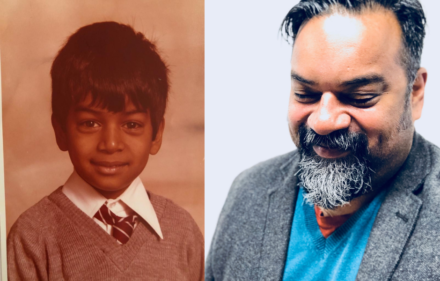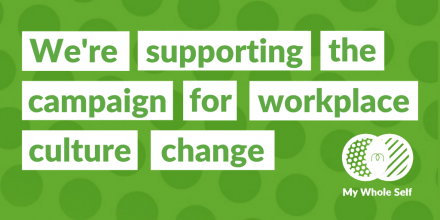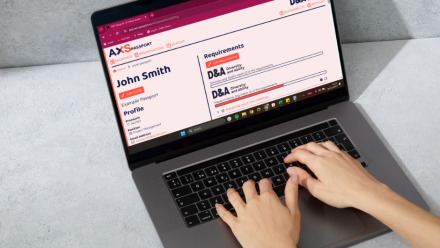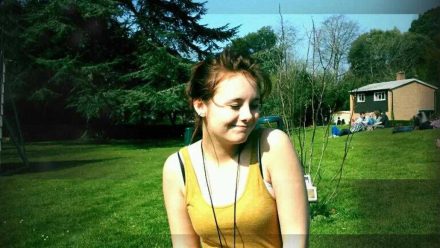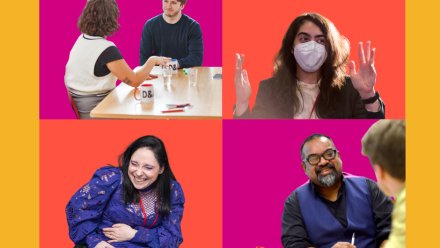“Building equity around race, class and culture allows all of us to bring our whole selves to work”
17th March 2021 by Atif Choudhury and Raphaele von Koettlitz
– Atif Choudhury’s words, CEO & Co-founder of Diversity and Ability & Co-founder of Zaytoun CiC
Diversity and Ability encourage workplace culture change where individuals have the safety to bring their whole selves to work. We are proud to be supporting ‘My Whole Self’, Mental Health First Aid (MHFA) England’s campaign to instil openness and inclusion in the workplace concerning mental health. This is something we work towards every day at D&A and sits at the heart of what we represent – a celebration of difference. At D&A, we believe that diversity holds so much value, and we have a collective responsibility to ensure each person feels welcome and supported enough to bring their whole self and their A-game to the table.
We asked Atif Choudhury, D&A’s CEO and co-founder, what bringing his ‘whole self’ to work looks like. Here’s what he had to say.
What does bringing your whole self to work mean to you?
“Growing our understanding of mental health and neurodiversity is critical in allowing people to bring their whole selves to work. Until we fully understand what’s standing in the way of building an all-encompassing sense of belonging, we cannot be surprised that people choose not to bare all. Despite the energy and emotional labour, it takes to mask parts of your identity, full disclosure only happens when we have built psychological safety and unwavering trust.”
“True inclusion moves at the speed of trust”
“When honoured, this can move faster than light and at other times this is a moment, imposed and uninvited that will take a lifetime. Shackled by over 400 years of trauma the speed here can never be expected to move faster than the safety it deserves.”
“We are on our journey to challenge structural racism, the patriarchy and ableism. I believe many people who are marginalised by these different forms of oppression will only come forward and bring their whole selves to work when we explicitly show them that they count. We must demonstrate we are doing all we can to break down the barriers they face. This means being overtly anti-racist, calling out misogyny and celebrating diversity in all it’s forms. When we build workplaces that illustrate our commitment to equality, fairness and respect, then we will start to change the tide.”
“After all, true diversity is a lot more than counting people, it is about insisting they count!”
What are the barriers you have faced in bringing your whole self to work?
“Growing up on a council estate in Thamesmead, as a young Bangladeshi with dyslexia, I often spent my time at school navigating racism and the fact that I seemed to think differently from my peers. I had to leave school at 16 years old to go and work to help support my family, at which point I started working in a bank. Whilst I was great with customers, my anxiety of dealing with numbers made work a daily stress.”
“At that point, I didn’t ‘know’ I was dyslexic, nor did anyone else. Access to a diagnosis and support is a privilege that I and many others like me didn’t and still don’t have (although we’re definitely moving in the right direction!). At school I often remained silent to protect myself, finding safety in the strong bonds of friendship and daydreams. I would often get summoned to the Head Teacher’s office for ‘laziness’, but the truth was I just didn’t think and learn in the formulaic way expected of me. Despite a deeply loving family, surviving the loss of my birth mother to suicide and early-childhood fostercare, the additional impact of learning isolation had consequences on my self worth, and as a result, my participation in school and the workplace. Despite the consistent innovations and exciting new ideas, my ability to recognise my strengths as different forms of intelligence was lost. My skills were often hidden due to the necessity to mask parts of my identity and a wish just to fit in.”
“In many communities, neurodiversity is still taboo, a belittled and rarely discussed subject. This is particularly true in working-class or migrant BAME communities and is rarely recognised as an innovative or creative force.”
“I firmly believe that the joys and the traumas of human experience fundamentally make us all neurodiverse, we’re just not all marginalised because of it.”
“Embracing neurodiversity and hidden differences is absolutely the right thing to do, for the individual and wider society, we are stronger for it. But we must be aware of the cultural and class differences that in some cases make this an impossibility and an uphill struggle. When I look around at the D&A team, I smile and think; ‘this is the organisation I needed when I was younger’. I feel humbled that together we can make people’s experience of neurodiversity and/or disablement a more positive, liberating one.”
What can we do to ensure people bring their ‘whole selves’ to work?
“We need to challenge powerlessness head on to ensure fair participation. Bringing your “whole self” to work is a privilege many people do not have. The emotional labour and sacrifices undertaken by marginalised people create benefits for everyone, and this needs to be recognised. It’s all of our responsibility to deconstruct the damages inflicted through exclusion, but it’s often a load that falls on the shoulders of those most affected.”
“That is why mutinies, rage and disruption need to be viewed as a positive force for meaningful change. Recognising the grace in which mutinies are born is brave work. Especially when it comes in differing languages, cultures and customs. But nevertheless, the grace is there. In our workplaces, it’s all around us. It comes from those who have used their lived experiences of disablement, mental health challenges and even fear, to make an invisible fight visible. Delivered through humility and moving beyond HR speak, they speak to power, they invite the afraid and the forgotten, creating a space of belonging for us all. We need to centre these voices and listen to their realities so we can make future changes inclusive, intersectional, meaningful and relevant!”
“Reframing structural, systemic racism that prevents BME participation is another example here. Seeing black/brown people as the only beneficiaries of dismantling racism at work is fundamentally flawed. First and foremost, acts of racism are an injury to oneself as well as the other; racism inherently dehumanises all of us, especially those inadvertently comforted by white supremacy. In a eurocentric framework, when the powerful stay passive or feel benevolent in addressing racism it does little to change the dynamics and nothing to recognise the healing role that justice plays in all of our lives, regardless of our differing colours. Embracing cultural humility here is a starting point. Recognising the need; our collective need, to flourish within non-racist states is humbling and only addressed through the lens of black and White mutual need. The civil society we wish for ourselves and our grandchildren cannot be made safe if others are left unsafe. This is a perspective that can be applied to so many intersectional agendas where participation is fragile and the ‘hard to reach’ have historically been the ‘easy to ignore’.”
“Regardless of colour, when a dominant group seeks out change, to learn, rather than to control, the group unknowingly supports its own psychological safety and begins to draw on the collective power of difference and not division. Through equality and equity, we are able to harness diverse voices, agency, ideas and innovations. In my search for ‘wholeness’, it is exactly this sharing of lived experience and diversity of thought that changed the world. Perhaps it’s the only thing that ever does.”
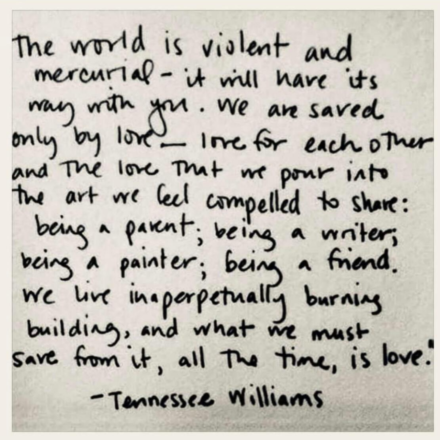
Tennessee Williams, 1982 – one of Atif’s favourite quotes
Join us on Thursday 18th March 2021 to celebrate ‘My Whole Self Day’ when people across the country will be encouraged to bring their whole self to work and also to build the workplace environments that enable this. You can download free resources to help you take part at mhfaengland.org/my-whole-self.
Atif will be taking part in a panel discussion hosted by MHFA England, happening from 1-2 pm on Thursday. Join Chief Executive Simon Blake and an expert panel to discuss the relationships between identity and mental health in the workplace, the importance of vulnerable leadership, and the power of making authentic connections at work, even in a virtual office.
Register for free on Eventbrite
You can now watch the session recording here:
